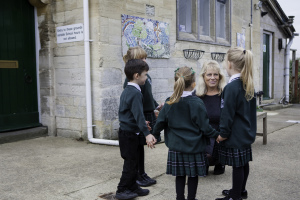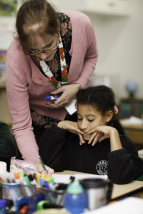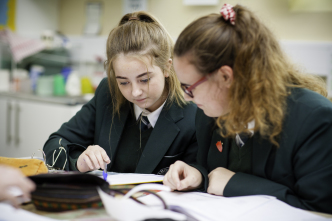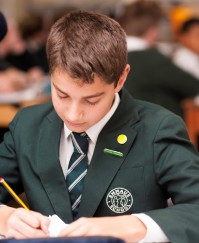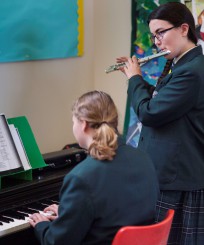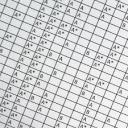Introduction
Choosing a school for your child is a huge decision and hopefully the information contained in this section will help you as you seek to make wise choices for your child’s education. Emmaus School is founded on Christian principles to educate children from 5-16 years in a caring, stable family atmosphere of love and respect. We would love to show you round our school, as nothing beats seeing a school in its normal, everyday routine. We offer your child the opportunity to do the same thing through experiencing a taster day. We also hold Open Day events. For more information about our upcoming events or to arrange a visit to Emmaus School please contact us at info@emmaus-school.org.uk or call the School Office to arrange an appointment.
The Curriculum
The Bible is central to all that is taught at Emmaus School, not in a false, forced way, but in a natural, God-centred way, so that the children learn that it was God who both created and sustains this universe and makes life meaningful. You can read more about the curriculum here.
The Curriculum for Reception to Year 6
We believe in striking a balance between traditional curriculum values and ensuring that pupils have plenty of opportunity to learn through doing and experiencing. Undoubtedly, reading is the key to unlocking the rest of the curriculum and Primary school teachers invest a lot of time to ensure pupils have the best possible start in learning to read.
Primary pupils also gain solid foundations in mathematics, spelling and handwriting by following carefully planned schemes of work and using a wide range of the best curriculum materials available. Through studying science, history, geography and Scripture, pupils gain an understanding of God's wonderful world, but there is still plenty of opportunity to develop creativity in music and art, and physical skills in PE and sport, as well getting an early start in modern foreign languages in French lessons. Play is important, too, and pupils make good use of the outdoor area for structured play and free recreation, as well as learning the basic skills through maths and language games.
The Curriculum for Year 7-11
We continue to build on the excellent work of the Primary Department and widen the curriculum to include subjects such as ICT, Food Technology and modern foreign languages, whilst still maintaining the balance of academic study and rich cultural experiences. Pupils are increasingly encouraged to take more responsibility for their own studies and become more independent learners. This stands them in good stead, should they decide to continue their studies at one of the local 6th Forms.
At GCSE Level, pupils normally take a core of 5 subjects: mathematics, English language, English literature, French and one of the sciences. Most students opt for another 3 or 4 subjects choosing from the following: chemistry, biology, physics, Spanish, history, RE, geography, ICT, music, art, food technology and PE.
Many of the GCSE courses lead to International GCSE qualifications, which have long been considered to be academically rigorous, thorough and excellent preparation for A Level, or the increasingly popular International Baccalaureate. Year after year, pupils gain excellent academic results which can be viewed on the School’s website. Year 10 and 11 pupils are also offered careers guidance and take part in work experience.
Pupil Assessment
Pupils’ progress is monitored by annual tests in reading and spelling which allow teachers to compare pupils to the national average in each year group. The Cognitive Abilities Test (GL Assessment) is used annually from Year 4 to test the children’s potential in the 3 areas of verbal, quantitative and non-verbal reasoning and, in the secondary department, these tests give accurate predictions of the GCSE grades individual pupils can be expected to achieve. Since it is not possible to ‘teach to the test’, lessons are devoted to teaching rather than preparing pupils to perform well in tests. Pupils also take end of topic tests throughout the year and senior pupils have an annual exam week in the summer term.
Provision for pupils with learning difficulties, disabilities or those for whom English is not their first language
The School has limited means to adequately staff and resource pupils with specific needs, however, consideration will be given to pupils with learning difficulties, disabilities, or those for whom English is not their first language. Each pupil's application is considered on its own merit, taking into account whether the School is adequately staffed and resourced to meet the individual pupil’s needs. Where a child has an Education Health and Care Plan, or special educational, physical or pastoral needs, the School will discuss with the parents what the School is able to offer, which may involve additional cost to the parents.
Extra-curricular Activities
Pupils are encouraged take advantage of the wide range of extra-curricular activities on offer. School events throughout the year offer the pupils opportunities to perform in singing, drama and music ensembles. Private music lessons are available during the School day. There are after school clubs where, for example, pupils can learn to play chess or take part in the Adventure Service Challenge and the Duke of Edinburgh Award.
The pupils organise a School Council and Christian Union themselves and thereby gain useful life and leadership skills, as well as serving the school and wider community through fundraising and other charitable ventures. Throughout the year, educational visits are arranged to support the curriculum and broaden the children’s cultural experiences. Visits to museums, galleries, science lectures and the theatre are arranged, as well as field trips, residential trips and exchange visits to France.
ISI Inspection Reports
The Governors are particularly pleased with the findings of the Educational Quality Inspection which took place in June 2023, where the quality of the pupils’ personal development was assessed as excellent, and the quality of the pupils’ academic and other achievements was assessed as good.
What the inspectors said:
“The quality of the pupils’ personal development is excellent.”
“The School’s Christian ethos is immediately apparent, is respected by pupils and permeates all areas of school life.”
“A very large majority of parents agree that the school actively promotes democracy, respect and tolerance of other people.”
“Pupils, including those with SEND and EAL, make strong progress over time, as evidenced by comprehensive assessment data.”
“Pupils display excellent attitudes to their learning, demonstrating an intrinsic desire to do well.”
This is a resounding tribute to the quality of all our staff - teaching, support and administrative. We were also delighted with the way our pupils conducted themselves over the course of the inspection. They can be rightly proud of the way in which they interacted with the team of inspectors throughout, and their achievements, work ethic and conduct all played a significant part in the very successful outcome of the Educational Quality Inspection.
There are aspects of the report that Governors would like to address:
Paragraph 2.10 regarding conducting online searches when appointing new staff
It is not mandatory to conduct online searches of job applicants (over and above the required checks), but ISI wanted evidence that this had been considered. The school has reflected on this point, and there is now a process in place for conducting online searches of candidates who have been shortlisted for interview.
Paragraph 2.11 regarding record keeping
Prior to the inspection, routine monitoring picked up that there was a gap in recording legionella checks and water temperature checks, and this had been rectified before the inspection.
Paragraph 2.12 regarding fire safety
The school’s last Fire Risk Assessment was in February this year. At the time of the inspection the school had obtained a quote for a new fire alarm system and was in the process of appointing a contractor to replace the system during the summer holidays. A new fire alarm system has now been installed.
Weekly testing of the fire alarm is a recommendation only, unless there is a good reason not to do so. The design of the previous fire alarm system meant that weekly testing of the fire alarm was not practical, but it was tested regularly at fire drills. It is also important to note that due to the small site, people always detect a fire and evacuate the building before the fire alarm system has had the time to activate! All records of fire checks were meticulously and continuously kept since the last inspection. Weekly testing of the fire alarm is now possible and is in place.
A significant number of staff have certified Fire Marshal training. Fire drills are held twice a term, usually on a different day of the week, to ensure that part time staff experience fire drills throughout the school year, and staff receive verbal and written feedback after each fire drill. ISI wanted to see evidence of annual refresher fire training for staff. This is scheduled for September each year and has already taken place this term.
Paragraph 2.13 regarding Risk Assessments
The school had maintained the same number of Risk Assessments since the last inspection, although some were not filed centrally. This has now been rectified.
Staff are individually coached in the writing of risk assessments specific to their areas of responsibility, and the risk assessments are checked by the Senior Leadership, who, when necessary, request teachers to amend their risk assessments accordingly. ISI wanted to see evidence of annual refresher training. This is scheduled for September each year and has already taken place this term and is formally recorded.
To read the full report please click here.
Progress Monitoring Visit
The school received its unannounced Progress Monitoring Visit in January 2024.
We are pleased that most of the standards are now met. The inspectors that conducted the Progress Monitoring Visit were helpful and supportive, and their report is clearly worded and informative. This means that the school now understands precisely what action is needed to meet the remaining standards.
Health and Safety [ISSR Part 3, Paragraph 11; EYFS 3.55] is not met, and the details are as follows:
2.10 This item in the report concerns legionella checks only, which had not been fully embedded in the school’s routine when the inspectors visited. All other Health and Safety checks have been consistently undertaken and recorded over a long period of time.
2.11 With regards to governor oversight, the work of Hannah Greenman, our Safeguarding Governor, was highlighted by the inspectors in their verbal feedback as an example of excellent practice, and we now need to put in place similar systems for the oversight of Health and Safety. This will include appointing a governor with the knowledge and skills necessary to ensure effective monitoring of Health and Safety.
2.12 There is a minor mismatch between policy and practice, and our Health and Safety Policy will be amended to ensure that the policy only mentions training that is necessary and appropriate for our setting.
Quality of Leadership and Management [ISSR Part 8, paragraph 34]
2.23 This standard will be met when the above actions have been completed.
Inspectors acknowledged that the school had made a lot of progress in a short space of time, and, in fact, we could have allowed ourselves more time when writing our action plan, something which we have noted for future reference.
It is becoming progressively harder for small schools to keep up with increasing regulations and frequent changes to the inspection framework. At the time of the full inspection in June 2023, the Governing Body only consisted of 4 governors, which is simply not enough. Although there are now 6 governors, we still need to keep on recruiting, and it is becoming harder to find people who are able to sacrifice the amount of time needed to fulfil the increasing responsibilities and the demands of the role. We would value your prayers that suitable candidates will be identified and appointed to strengthen the Governing Body.
To read the full report please click HERE
Testimonies
For first hand accounts of how parents and children have enjoyed and appreciated life at Emmaus School, click here
School Prospectus, Admissions and Application Form
For further information about Emmaus School admissions, please download a copy of the prospectus. There's also a download available of the application form.
If you have any further queries or would like to arrange a visit to Emmaus School, please feel free to contact us by email or by telephone during school hours.
APPLICATION FORM Reception BLANK.pdf
Adobe Acrobat document [590.7 KB]
APPLICATION FORM Transfer BLANK.pdf
Adobe Acrobat document [588.1 KB]
Emmaus School Term Dates
GCSE Results
GCSE Results 2023
Once again we are delighted with our GCSE results, and 2 of our top performing pupils achieved a 100% pass rate at the higher grades (9-7), in a year when fewer of the top grades were awarded. This is an indication of the quality of remote education which teachers provided during the 2 years of disruption to education caused by the Covid-19 pandemic.
Emmaus School has small cohorts each academic year, and this means that our statistics have the potential to vary quite widely year on year. Just one pupil not performing as well as expected can bring down the average results. As a non-selective school, we have a variety of abilities, and it is a testimony to the quality of teaching that 100% of pupils achieved at least 5 GCSEs, at Grades 9-4.
Our Year 10 students who took GCSE RE a year early did extremely well, too. 86% of the Y10 pupils achieved either Grade 8 or 9.
Here are some of the headlines:
- 100% of pupils achieved at least 6 GCSEs at Grades 9-4.
- 100% of pupils passed GCSE Maths and English.
- Over half of the exams taken were awarded the higher grades (9-7)
International GCSEs
At Emmaus School, pupils take Edexcel International GCSEs in the following subjects: English, history, geography, chemistry and physics. IGCSE stands for “International General Certificate of Secondary Education”. It is equivalent to the GCSE qualification which is taken by students in Year 10 – 11 in the UK to prepare them for further pre-university level study, such as A-levels.
The IGCSE is the ‘international’ version of the GCSE as it is available in many countries around the world. In the UK, the IGCSE is typically taught at international schools or private schools, rather than at state schools, and it is recognised in the UK and internationally as the gateway to further academic study in 6th form colleges, universities and both in the UK and beyond.
IGCSEs have long been a popular choice in independent schools as historically they were viewed more rigorous and offered more stability due fewer Government-led changes. IGCSEs were first made available in state schools in 2010, but have now been phased out to reflect the move to reduce the amount of coursework required in the GCSE examination to the absolute minimum, and the greater emphasis on the final exam, after two years of study. This means that there are now very few differences between IGCSEs and GCSEs, and providers of the IGCSE examinations have robust measures in place to ensure a fair comparison with GCSE results.
Unfortunately, the Government does not include IGCSE results in the league tables, and this may mean a decline in schools offering the qualification in the future. We will continue to watch future developments and continue to adapt to the ever-changing English examination system based on what is best for our students.
CAT Results
CAT Results 2023
Every October, pupils in Years 4-11 take the Cognitive Abilities Test which is produced by GL Assessment and is widely used by schools in the independent and state sectors. This enables the School to track the progress of each pupil annually against national data, and for the older pupils, it gives a useful prediction of how they are likely to perform at GCSE Level.
Year on year, the CAT tests show high standards of achievement by Emmaus School pupils, despite the fact that the School does not select pupils on the basis of their ability. The headlines for the 2023 tests are as follows:
Language
72% of pupils are above average.
Maths
90% of pupils are at least average.
Non-verbal
98% of pupils are at least average.
61% are above average
Spatial
98% of pupils are at least average, and 59% are above average.
Pupils with Special Educational Needs
100% of pupils with SEND are at least average in verbal tests.
Reading and Spelling Results 2023-2024
Spelling and Reading Test Results June 2024
Each year, pupils from Years 1 – 9 are tested in reading and spelling using tests supplied by GL Assessment – The Suffolk Reading Test and the Nelson Single Word Spelling Test. These standardised tests indicate how our pupils are doing compared with the national average.
Overall, 98% of children are average or above average in reading, and in spelling 100% of children are average or above average.
Pupils with SEN achieved well in tests, with 100% of pupils with SEN achieving average or above in both reading and spelling.
|
ALL PUPILS |
READING |
|
|
|
Reading Tests |
Below average |
Average |
Above Average |
|
2019-20 |
5% |
30% |
65% |
|
2020-21 |
0 |
29% |
71% |
|
2021-22 |
3% |
27% |
70% |
|
2022-23 |
5% |
37% |
57% |
|
2023-24 |
2% |
38% |
60% |
|
ALL PUPILS |
SPELLING |
|
|
|
Spelling Tests |
Below average |
Average |
Above Average |
|
2019-20 |
6% |
31% |
63% |
|
2020-21 |
5% |
28% |
67% |
|
2021-22 |
2% |
38% |
60% |
|
2022-23 |
4% |
37% |
59% |
|
2023-24 |
0 |
43% |
57% |
The Amazing Story behind Emmaus School
The Story of the new Christian Schools - Sylvia Baker and David Freeman
Prayer prepares the way
In the early 1970s, some Christians in Bradford-on-Avon became concerned about the need for a Christian school in their area. They held some meetings in their church,
but nothing concrete ever came of it. For some of them, the burden remained and they prayed through the years that God would eventually establish a school, even though by now it was too late for
their own children to benefit from it. Click here to read the chapter from this book which tells
the story of Emmaus.
The book is available from Christian
Focus and Amazon.


